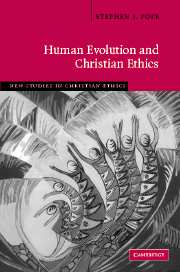Book contents
- Frontmatter
- Contents
- General editor's preface
- Acknowledgments
- Introduction
- Chapter 1 Evolution and religion
- Chapter 2 The indifference of Christian ethics to human evolution
- Chapter 3 Varieties of reductionism
- Chapter 4 Faith, creation, and evolution
- Chapter 5 Chance and purpose in evolution
- Chapter 6 Human nature and human flourishing
- Chapter 7 Freedom and responsibility
- Chapter 8 Human dignity and common descent
- Chapter 9 Christian love and evolutionary altruism
- Chapter 10 The natural roots of morality
- Chapter 11 Natural law in an evolutionary context
- Chapter 12 Sex, marriage, and family
- Bibliography
- Index of scriptural citations
- Index of names and subjects
Chapter 10 - The natural roots of morality
Published online by Cambridge University Press: 26 June 2009
- Frontmatter
- Contents
- General editor's preface
- Acknowledgments
- Introduction
- Chapter 1 Evolution and religion
- Chapter 2 The indifference of Christian ethics to human evolution
- Chapter 3 Varieties of reductionism
- Chapter 4 Faith, creation, and evolution
- Chapter 5 Chance and purpose in evolution
- Chapter 6 Human nature and human flourishing
- Chapter 7 Freedom and responsibility
- Chapter 8 Human dignity and common descent
- Chapter 9 Christian love and evolutionary altruism
- Chapter 10 The natural roots of morality
- Chapter 11 Natural law in an evolutionary context
- Chapter 12 Sex, marriage, and family
- Bibliography
- Index of scriptural citations
- Index of names and subjects
Summary
Evolutionists have advanced several theories of how morality as a social institution is related to human evolution. They offer three major ways of accounting for morality as a social institution and for the human moral sense: as adaptive, as an evolutionary by-product, and as a product of culture rather than biological evolution. This chapter argues that while each approach has its own weaknesses, each can help Christian ethics understand important aspects of morality.
EVOLUTIONARY THEORIES OF MORALITY
The social institution of morality probably came into use to address certain fundamental human needs rooted in our emergent cognitive, emotional, and social capacities. Morality as such did not evolve biologically, but some human capacities that are essential to morality have evolutionary roots.
Morality as adaptive
Ruse and Wilson argue that the “moral sense” is a biological adaptation, “just like hands and feet.” “Belief in morality,” they write, “is merely an adaptation put in place to further our reproductive ends.” Wilson's answer to Gustafson's question, “What do we value about the human?” is clear: despite what people say, we really value inclusive reproductive fitness above all else. Wilson is convinced that sociobiology can explain the deepest nature and function of morality. Rather than a supernatural code delivered from “on high,” or a “spark” of the divine lodged in each person's conscience, moral codes have originated because they serve the fitness interests of their adherents.
- Type
- Chapter
- Information
- Human Evolution and Christian Ethics , pp. 250 - 267Publisher: Cambridge University PressPrint publication year: 2007

